Tesla Cybertruck delivered to first US customers in Austin Gigafactory
After several years of delays, the pioneering electric car company has launched its first full-size pick-up truck in the United States – and Australia is on the radar.
New Cars
Don't miss out on the headlines from New Cars. Followed categories will be added to My News.
Tesla has finally delivered its hotly anticipated Cybertruck to ten lucky customers at a glitzy live-streamed event in its Austin, Texas Gigafactory.
Founder and chief executive Elon Musk personally delivered vehicles to customers off the production line after delivering a speech full of hyperbole and a little self-deprecation to an online audience of almost 2 million.
“Once every five to ten years something really special, a really unusual product comes along and we’ll remember those special moments
“I think it’s our best product. I think it’s the most unique thing on the road. And finally the future will look like the future,” the tech billionaire told an adoring live audience.
Musk claimed the Cybertruck was a “better truck than a truck and a better sports car than a sports car”.
“It’s very rare that a product comes along that is seemingly impossible. That people said was impossible, that experts said was impossible,” he said.
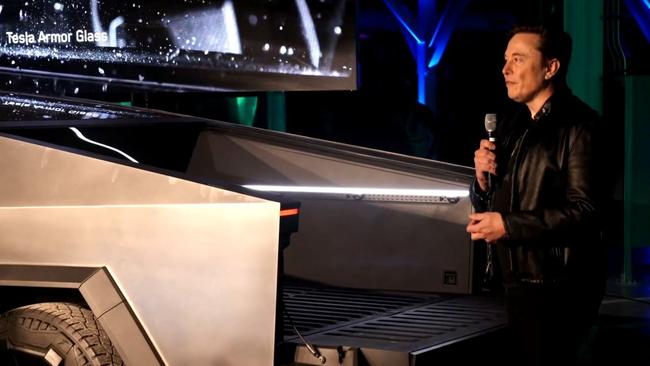
The presentation included a number of stunts highlighting the capability of the truck.
In one, the Cybertruck beat a Porsche 911 over the traditional quarter-mile sprint – while towing another 911.
Musk said the Cybertruck reaches 100km/h in about 2.6 seconds, which is faster than some supercars.
In another stunt, a gunman unleashed a round of shots from a machine gun without piercing the car’s stainless steel panels.
“If Al Capone showed up with a Tommy gun and emptied the entire magazine into the car door, you would still be alive,” he said.
“People said why did you make it bulletproof and I said ‘why not?’”
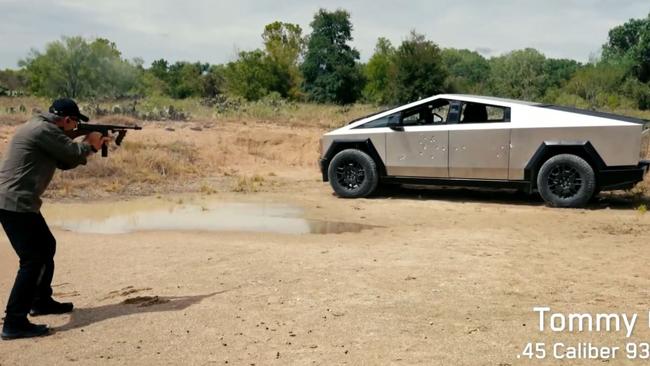
Musk also recreated his failed stunt at the original unveiling of a prototype in 2019, when he smashed a window with a steel ball while trying to demonstrate the toughness of the truck’s glass.
This time the stunt went to plan, although he used a baseball this time.
Musk said the truck was also a practical, capable work truck.
“It’s basically an incredibly useful truck. It’s not just some grandstanding showpiece like me,” he said.
The cheapest model in the range starts at $US60,990 ($92,000), well above the initial $US40,000 esimate when it was first revealed in 2019.
Musk revealed some technical details, including the payload of “more than a tonne” and a towing capacity of 5000kg. The Toyota HiLux can only tow 3500kg.
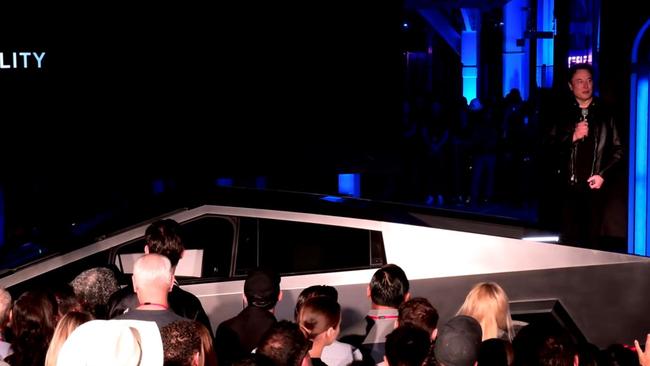
The truck also has adaptive suspension, which adjusts the ride height for the payload it’s carrying and the road conditions.
The Cybertruck had “insane off-road capability” thanks to locking differentials and torque vectoring.
Musk said the low centre of gravity made it less prone to rollover than rival pick-up trucks. It was also safe in a crash.
“If you’re ever in an argument with another car you will win,” he said.
The truck has “steer by wire”, which reduces its turning circle at low speeds.
The futuristic, angular electric pick-up truck has been plagued by delays since it was first unveiled almost exactly four years ago.
Tesla has been taking deposits for the Cybertruck since the unveiling, but has regularly put back the production date, which was initially slated for late 2021.
Australians are unlikely to see the Cybertruck any time before 2027, as the vehicle in its current form is unlikely to meet Australian design rules.
Tesla also claims to have a bank of more than a million US orders for the truck, which would take more than four years to clear at planned production rates.
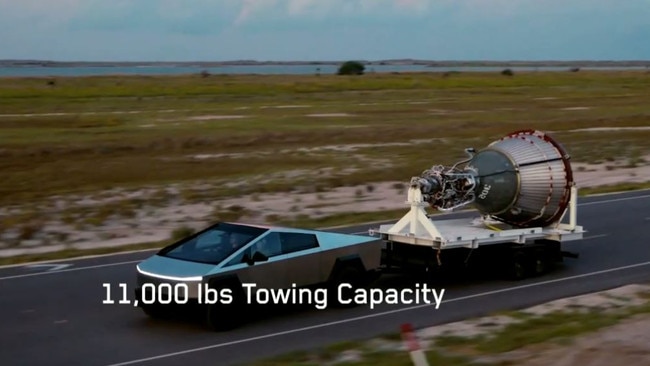
Tesla plans to start slowly with production before ramping up to 250,000 units by 2025.
The company originally took orders from prospective Australian customers, but removed the ordering function from its local website in May last year, a move many interpreted as confirmation it would no longer be exported here.
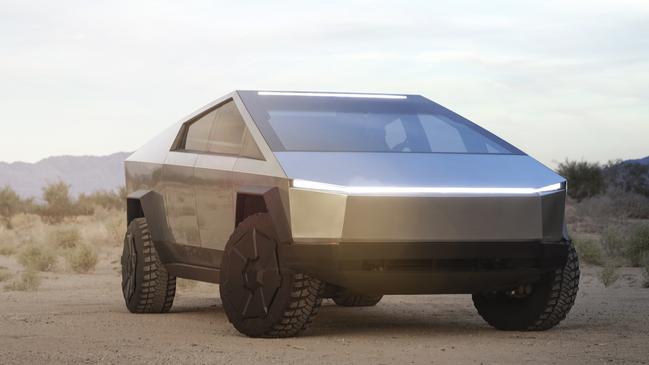
But it is believed the brand remains keen to make an Australian version happen eventually. That could mean exploring tweaks to the vehicle to make it compliant with local regulations.
It’s likely that when it arrives it will cost well into six figures, placing it in competition with big petrol and diesel-powered picks from RAM, General Motors, Ford and Toyota.



